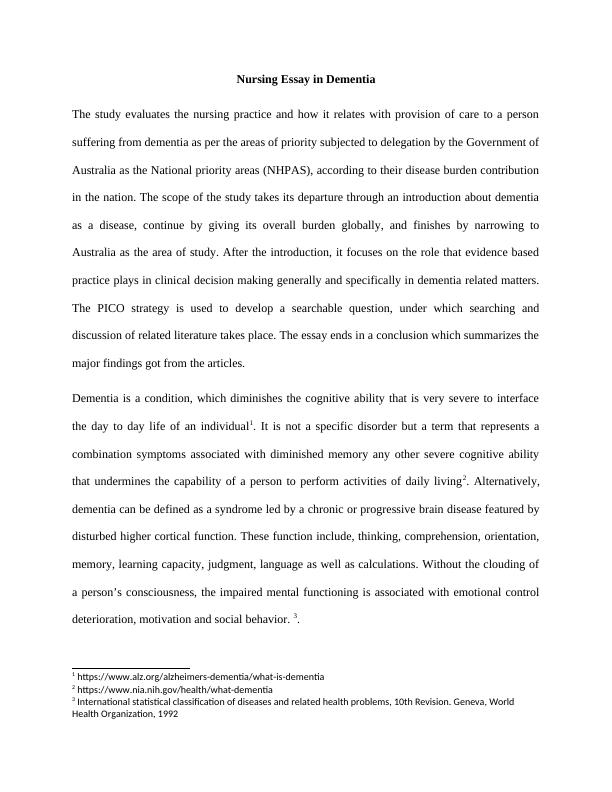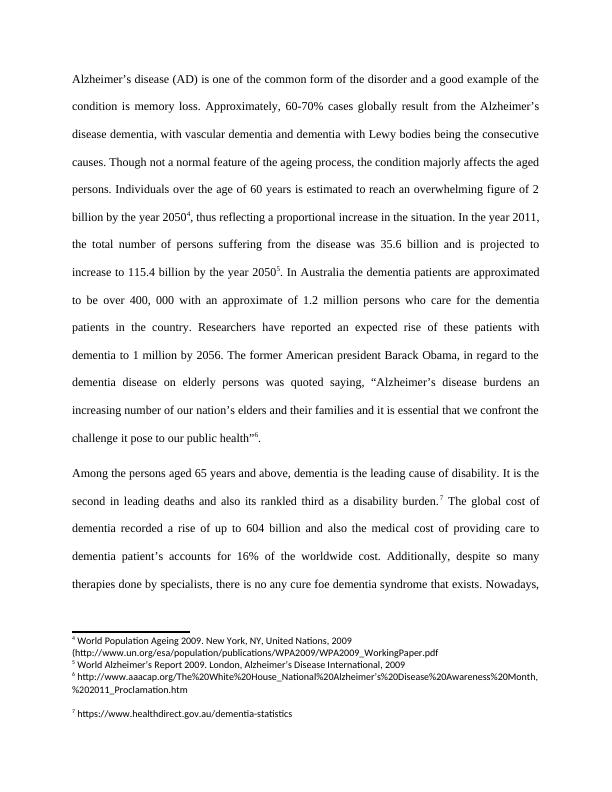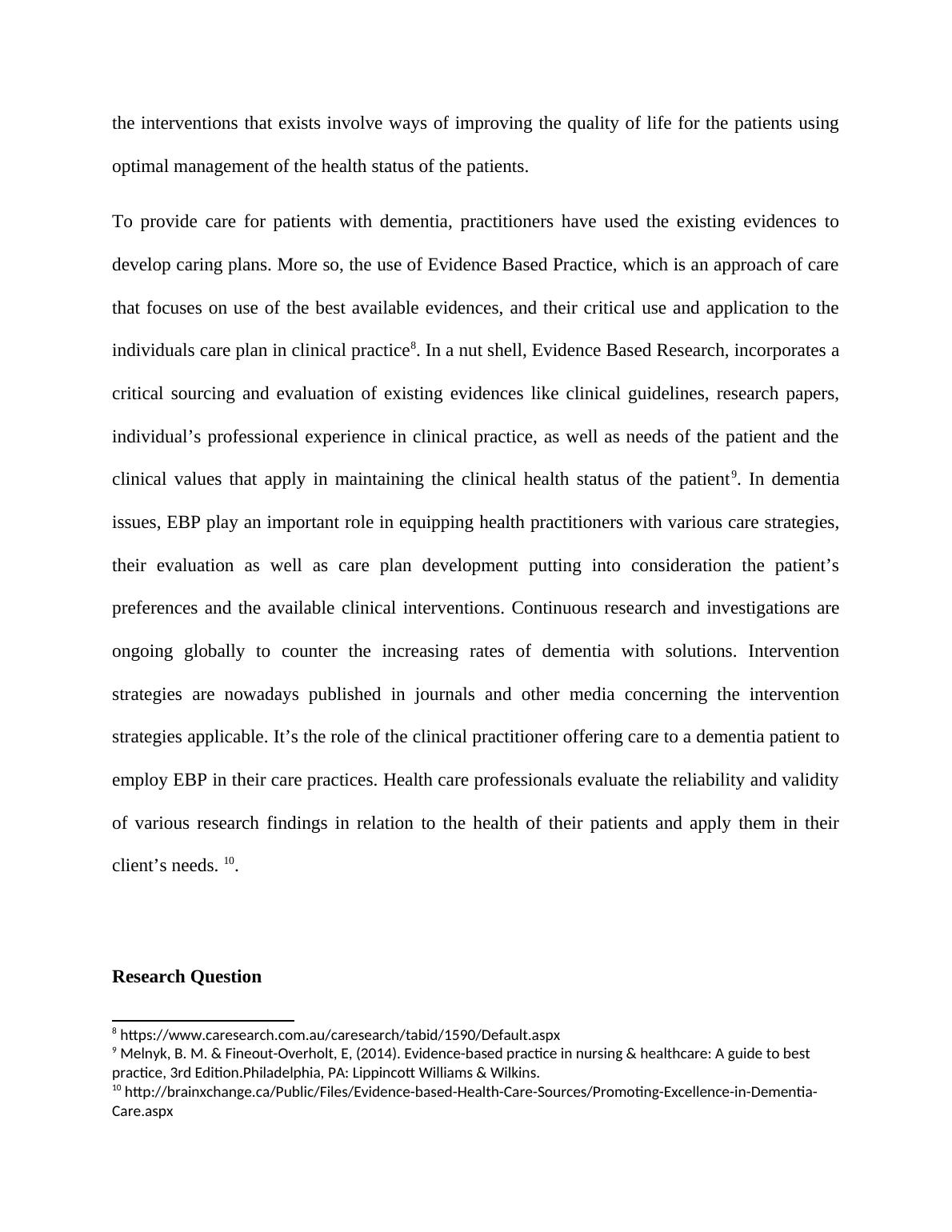Nursing Essay in Dementia: Evidence Based Practice and Caregiver Management
Added on 2023-06-04
8 Pages2518 Words346 Views
Nursing Essay in Dementia
The study evaluates the nursing practice and how it relates with provision of care to a person
suffering from dementia as per the areas of priority subjected to delegation by the Government of
Australia as the National priority areas (NHPAS), according to their disease burden contribution
in the nation. The scope of the study takes its departure through an introduction about dementia
as a disease, continue by giving its overall burden globally, and finishes by narrowing to
Australia as the area of study. After the introduction, it focuses on the role that evidence based
practice plays in clinical decision making generally and specifically in dementia related matters.
The PICO strategy is used to develop a searchable question, under which searching and
discussion of related literature takes place. The essay ends in a conclusion which summarizes the
major findings got from the articles.
Dementia is a condition, which diminishes the cognitive ability that is very severe to interface
the day to day life of an individual1. It is not a specific disorder but a term that represents a
combination symptoms associated with diminished memory any other severe cognitive ability
that undermines the capability of a person to perform activities of daily living2. Alternatively,
dementia can be defined as a syndrome led by a chronic or progressive brain disease featured by
disturbed higher cortical function. These function include, thinking, comprehension, orientation,
memory, learning capacity, judgment, language as well as calculations. Without the clouding of
a person’s consciousness, the impaired mental functioning is associated with emotional control
deterioration, motivation and social behavior. 3.
1 https://www.alz.org/alzheimers-dementia/what-is-dementia
2 https://www.nia.nih.gov/health/what-dementia
3 International statistical classification of diseases and related health problems, 10th Revision. Geneva, World
Health Organization, 1992
The study evaluates the nursing practice and how it relates with provision of care to a person
suffering from dementia as per the areas of priority subjected to delegation by the Government of
Australia as the National priority areas (NHPAS), according to their disease burden contribution
in the nation. The scope of the study takes its departure through an introduction about dementia
as a disease, continue by giving its overall burden globally, and finishes by narrowing to
Australia as the area of study. After the introduction, it focuses on the role that evidence based
practice plays in clinical decision making generally and specifically in dementia related matters.
The PICO strategy is used to develop a searchable question, under which searching and
discussion of related literature takes place. The essay ends in a conclusion which summarizes the
major findings got from the articles.
Dementia is a condition, which diminishes the cognitive ability that is very severe to interface
the day to day life of an individual1. It is not a specific disorder but a term that represents a
combination symptoms associated with diminished memory any other severe cognitive ability
that undermines the capability of a person to perform activities of daily living2. Alternatively,
dementia can be defined as a syndrome led by a chronic or progressive brain disease featured by
disturbed higher cortical function. These function include, thinking, comprehension, orientation,
memory, learning capacity, judgment, language as well as calculations. Without the clouding of
a person’s consciousness, the impaired mental functioning is associated with emotional control
deterioration, motivation and social behavior. 3.
1 https://www.alz.org/alzheimers-dementia/what-is-dementia
2 https://www.nia.nih.gov/health/what-dementia
3 International statistical classification of diseases and related health problems, 10th Revision. Geneva, World
Health Organization, 1992

Alzheimer’s disease (AD) is one of the common form of the disorder and a good example of the
condition is memory loss. Approximately, 60-70% cases globally result from the Alzheimer’s
disease dementia, with vascular dementia and dementia with Lewy bodies being the consecutive
causes. Though not a normal feature of the ageing process, the condition majorly affects the aged
persons. Individuals over the age of 60 years is estimated to reach an overwhelming figure of 2
billion by the year 20504, thus reflecting a proportional increase in the situation. In the year 2011,
the total number of persons suffering from the disease was 35.6 billion and is projected to
increase to 115.4 billion by the year 20505. In Australia the dementia patients are approximated
to be over 400, 000 with an approximate of 1.2 million persons who care for the dementia
patients in the country. Researchers have reported an expected rise of these patients with
dementia to 1 million by 2056. The former American president Barack Obama, in regard to the
dementia disease on elderly persons was quoted saying, “Alzheimer’s disease burdens an
increasing number of our nation’s elders and their families and it is essential that we confront the
challenge it pose to our public health”6.
Among the persons aged 65 years and above, dementia is the leading cause of disability. It is the
second in leading deaths and also its rankled third as a disability burden.7 The global cost of
dementia recorded a rise of up to 604 billion and also the medical cost of providing care to
dementia patient’s accounts for 16% of the worldwide cost. Additionally, despite so many
therapies done by specialists, there is no any cure foe dementia syndrome that exists. Nowadays,
4 World Population Ageing 2009. New York, NY, United Nations, 2009
(http://www.un.org/esa/population/publications/WPA2009/WPA2009_WorkingPaper.pdf
5 World Alzheimer’s Report 2009. London, Alzheimer’s Disease International, 2009
6 http://www.aaacap.org/The%20White%20House_National%20Alzheimer’s%20Disease%20Awareness%20Month,
%202011_Proclamation.htm
7 https://www.healthdirect.gov.au/dementia-statistics
condition is memory loss. Approximately, 60-70% cases globally result from the Alzheimer’s
disease dementia, with vascular dementia and dementia with Lewy bodies being the consecutive
causes. Though not a normal feature of the ageing process, the condition majorly affects the aged
persons. Individuals over the age of 60 years is estimated to reach an overwhelming figure of 2
billion by the year 20504, thus reflecting a proportional increase in the situation. In the year 2011,
the total number of persons suffering from the disease was 35.6 billion and is projected to
increase to 115.4 billion by the year 20505. In Australia the dementia patients are approximated
to be over 400, 000 with an approximate of 1.2 million persons who care for the dementia
patients in the country. Researchers have reported an expected rise of these patients with
dementia to 1 million by 2056. The former American president Barack Obama, in regard to the
dementia disease on elderly persons was quoted saying, “Alzheimer’s disease burdens an
increasing number of our nation’s elders and their families and it is essential that we confront the
challenge it pose to our public health”6.
Among the persons aged 65 years and above, dementia is the leading cause of disability. It is the
second in leading deaths and also its rankled third as a disability burden.7 The global cost of
dementia recorded a rise of up to 604 billion and also the medical cost of providing care to
dementia patient’s accounts for 16% of the worldwide cost. Additionally, despite so many
therapies done by specialists, there is no any cure foe dementia syndrome that exists. Nowadays,
4 World Population Ageing 2009. New York, NY, United Nations, 2009
(http://www.un.org/esa/population/publications/WPA2009/WPA2009_WorkingPaper.pdf
5 World Alzheimer’s Report 2009. London, Alzheimer’s Disease International, 2009
6 http://www.aaacap.org/The%20White%20House_National%20Alzheimer’s%20Disease%20Awareness%20Month,
%202011_Proclamation.htm
7 https://www.healthdirect.gov.au/dementia-statistics

the interventions that exists involve ways of improving the quality of life for the patients using
optimal management of the health status of the patients.
To provide care for patients with dementia, practitioners have used the existing evidences to
develop caring plans. More so, the use of Evidence Based Practice, which is an approach of care
that focuses on use of the best available evidences, and their critical use and application to the
individuals care plan in clinical practice8. In a nut shell, Evidence Based Research, incorporates a
critical sourcing and evaluation of existing evidences like clinical guidelines, research papers,
individual’s professional experience in clinical practice, as well as needs of the patient and the
clinical values that apply in maintaining the clinical health status of the patient9. In dementia
issues, EBP play an important role in equipping health practitioners with various care strategies,
their evaluation as well as care plan development putting into consideration the patient’s
preferences and the available clinical interventions. Continuous research and investigations are
ongoing globally to counter the increasing rates of dementia with solutions. Intervention
strategies are nowadays published in journals and other media concerning the intervention
strategies applicable. It’s the role of the clinical practitioner offering care to a dementia patient to
employ EBP in their care practices. Health care professionals evaluate the reliability and validity
of various research findings in relation to the health of their patients and apply them in their
client’s needs. 10.
Research Question
8 https://www.caresearch.com.au/caresearch/tabid/1590/Default.aspx
9 Melnyk, B. M. & Fineout-Overholt, E, (2014). Evidence-based practice in nursing & healthcare: A guide to best
practice, 3rd Edition.Philadelphia, PA: Lippincott Williams & Wilkins.
10 http://brainxchange.ca/Public/Files/Evidence-based-Health-Care-Sources/Promoting-Excellence-in-Dementia-
Care.aspx
optimal management of the health status of the patients.
To provide care for patients with dementia, practitioners have used the existing evidences to
develop caring plans. More so, the use of Evidence Based Practice, which is an approach of care
that focuses on use of the best available evidences, and their critical use and application to the
individuals care plan in clinical practice8. In a nut shell, Evidence Based Research, incorporates a
critical sourcing and evaluation of existing evidences like clinical guidelines, research papers,
individual’s professional experience in clinical practice, as well as needs of the patient and the
clinical values that apply in maintaining the clinical health status of the patient9. In dementia
issues, EBP play an important role in equipping health practitioners with various care strategies,
their evaluation as well as care plan development putting into consideration the patient’s
preferences and the available clinical interventions. Continuous research and investigations are
ongoing globally to counter the increasing rates of dementia with solutions. Intervention
strategies are nowadays published in journals and other media concerning the intervention
strategies applicable. It’s the role of the clinical practitioner offering care to a dementia patient to
employ EBP in their care practices. Health care professionals evaluate the reliability and validity
of various research findings in relation to the health of their patients and apply them in their
client’s needs. 10.
Research Question
8 https://www.caresearch.com.au/caresearch/tabid/1590/Default.aspx
9 Melnyk, B. M. & Fineout-Overholt, E, (2014). Evidence-based practice in nursing & healthcare: A guide to best
practice, 3rd Edition.Philadelphia, PA: Lippincott Williams & Wilkins.
10 http://brainxchange.ca/Public/Files/Evidence-based-Health-Care-Sources/Promoting-Excellence-in-Dementia-
Care.aspx

End of preview
Want to access all the pages? Upload your documents or become a member.
Related Documents
Nursing Intervention in Geriatric Dementia Managementlg...
|8
|2979
|42
Alzheimer Dementia In UK - Presentationlg...
|18
|1670
|17
Dementia Care: Symptoms, Pathophysiology, and MMSE Assessment Toollg...
|19
|5501
|339
Dementia: Alarming Rise and Impactlg...
|9
|2499
|267
Management of Chronic Disease: Alzheimer's Disease and Dementialg...
|16
|5859
|388
Public Health Surveillance Resultslg...
|8
|1958
|23
